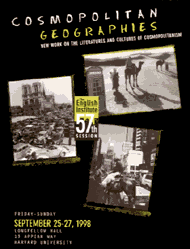
Cosmopolitan
Geographies
57th Session
Friday - Sunday
September 25-27, 1998
Longfellow Hall
13 Appian Way
Harvard University
What is cosmopolitanism? The 57th annual meeting of The English Institute seeks to chart the past and the present of cosmopolitanism, its alternatives, and their possible futures on the threshold of the twenty-first century. Taking a symbolic excursion through those regions where various texts, genres, and literatures map and remap worlds we inhabit, the conference brings into juxtaposition a diversity of historical, cultural, philosophical, and aesthetic terrains: from Chaucer’s England and medieval Italy to emergent empires and early modern trade; from urban Europe and its ecology to the Holocaust; from Confucian China and Buddhist Tibet to postcolonial Africa and India; and from the international stage in New York to contemporary American theory and poetry.
Friday
BRUCE ROBBINS, Rutgers University
The Village of the Liberal Managerial Class
KIM F. HALL, Georgetown University
Gender, Labor, and Pleasure in Early Modern “Sugar-Work”
ROBERT R. EDWARDS, The Pennsylvania State University
“The Metropol and the Mayster-toun”: Cosmopolitanism and Late-Medieval Literary Culture
BHARATI MUKHERJEE, University of California, Berkeley
An Indian Writer’s Cosmopolitan Worlds
Saterday
DAVID HARVEY, The Johns Hopkins University
Urban Ecologies and Moral Orders
PHENG CHEAH, Northwestern University
Chinese Cosmopolitanism and Postcolonial National Memory
SHARON MARCUS, University of California, Berkeley
Anne Frank and the Production of Universal Pathos
ROBERT THURMAN, Columbia University
Tibetan Buddhist Civilization and Contemporary Western Cosmopolitanism
Sunday
UNA CHAUDHURI, New York University
Cosmopolitanism and Theater
K. ANTHONY APPIAH, Harvard University
Africa and Cosmopolitanism
Program directors
K. Anthony Appiah, Vinay Dharwadker, and Karen Newman.